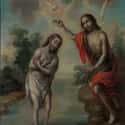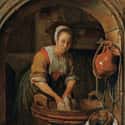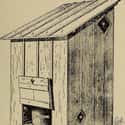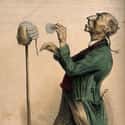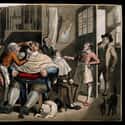-
(#2) Protestantism Conflated Uncleanliness With Sin
Doctors were conflicted on personal hygiene, with some practitioners believing bodily oils and the like were important to maintain health. Others believed cleanliness was essential to keep disease and illness away. To compound those attitudes, bathing practices and ideas about cleanliness in colonial America were heavily influenced by religious ideology.
Puritans associated a lack of cleanliness with the devil and sin, connections that also had social implications. Cleanliness was directly connected to morality, and individuals who bathed were less likely to take part in sin, commit wrongdoings, and be poor. Water was purifying from head to toe, with the "filthiness of person engender[ing] filthiness of mind."
Clean bodies, clean clothes, clean households, and clean settlements all contributed to spiritual health. Puritans struggled with the idea of bathing having negative implications for morality, however. Public baths, most specifically, were thought to contribute to disease and sexual impropriety.
-
(#12) Body Odor In Women Was Thought To Be A Mechanism Of Self-Defense
Attitudes about bathing during the colonial period in America were not uniform, but some of the country's Founding Fathers were clear in how they viewed the cleanliness of women. Thomas Jefferson, for example, told his daughter, Martha, "nothing is so disgusting to our sex as a want of cleanliness and delicacy in yours."
Doctors in the late 18th century advised women to bathe, in large part to cure illnesses that affected female reproductive organs. While Thomas Ewell, a doctor from Virginia, acknowledged the prevailing wisdom that women "were so constituted as to become offensive to the nose... for the purpose of suppressing too ardent devotion of males," cleanliness was of the higher order. Women may use smell as "a [means of] defense... to ensure protection, by rendering themselves as disgusting as possible," but the stench was offensive to all women.
-
(#7) Lye Soap Was Used For Clothing And Dishes, Not For Personal Care
Wealthy colonists may have imported fragrant soaps from Europe, but most colonists made their own soap or purchased it locally. Lye soap - made from a mixture of animal fat, lye, and ash - in colonial America was harsh and used only to clean clothes, dishes, and parts of the home. Lye soap was made with little regard for measuring, and the process itself was time-consuming and smelly.
The use of lye soap made doing laundry in colonial American that much more difficult. The harsh concoction, combined with hauling water, heating fires, wringing clothes, and hanging items to dry, added to the already exhausting task. As a result, only clothes that got the dirtiest - underwear, aprons, diapers - were washed with any amount of regularity.
-
(#5) Outhouses And Privy Pots Were Used For Disposal Of All Kinds
Colonial households had outhouses - more accurately a covered hole in the ground - near their cabin. When individuals couldn't or didn't visit the outhouse, they could use the chamberpot inside. Chamberpots had to be emptied regularly, but were usually just dumped out of a window or near the house. In rural settings, people often lived near water sources. Human waste found its way into streams, rivers, and lakes, contaminating drinking water and spreading disease.
In urban centers like Philadelphia, however, privy pots excavated in 2014 revealed more than just typical household and human waste. When archaeologists found a dozen brick-lined privy shafts behind what was once an illegal tavern, they unearthed glasses, bottles, bowls, and drinking tankards. Other items included tanning supplies, wig curlers, and pottery made made and used by local artisans.
According to archaeologist Rebecca Yamin, the human waste was present but, more than anything, the find - which dates from right around the Revolutionary War - gave a sense of "people drinking and talking politics and arguing."
-
(#4) Powdered Wigs Were The Solution To - And Cause Of - Lice
In colonial America, members of the middle and upper classes wore powdered wigs. Men and women alike donned wigs made out of human and animal hair, while often keeping their own hair very short. As lice was common, shaving one's head also helped prevent bugs from infesting hair. Wigs themselves were vulnerable to bugs, however, and to keep them clean and presentable, individuals sent them out for regular treatment or had slaves and servants "dress" them.
Ideally, wigs were cared for weekly, but it was a costly process and people sometimes went weeks or months without getting a proper cleaning. Wigs could be boiled to get rid of lice, and they were often covered in fragrances that repelled bugs. Some common scents included bergamot, bay leaves, and sassafras. Powders and oils also hid the smell of the person - and the hair itself - but pomades used to style wigs attracted insects that would get stuck in the sticky substance.
-
(#10) Shaving Was Something Done For Men By Men
The earliest Europen settlers in North America didn't shave, with smooth, hair-free faces becoming common only during the mid-18th century. Men, on the other hand, visited barbers when they wanted a shave. Carried out with straight razors, shaves were done by skilled barbers. To be a barber was considered a lowly profession, however, in large part due to its racial implications. Many slaves shaved their masters while free nonwhites worked as barbers in a society in which white labor was considered too valuable for the task.
There's very little evidence to suggest that women shaved any part of their bodies, especially since conventions dictated women show no significant amount of skin. Even hair on a woman's face wasn't shaved, in part because shaving was dangerous and "bloodbaths could only be prevented by experienced hands."
Women may have plucked hairs or used depilatory creams instead. Several recipes in medical handbooks that circulated in England and the colonies, specifically The Birth of Mankind (1540), included recipes for depilatories that combined limestone, arsenic, and other substances.
New Random Displays Display All By Ranking
About This Tool
As we all know, the history of colonial America was dark and brutal. Numerous slaves were trafficked to the American continent, where they could not get basic survival guarantees and medical and health care. We all know that frequent hand washing is the key to preventing the spread of diseases. But looking back at the history of colonial America, many people even took a bath only a few times a year at that time.
This means that the health situation of the early Americans was worse. For the early American colonists, hygiene basically was meaningless. The random tool shares 12 disgusting facts about hygiene In colonial America.
Our data comes from Ranker, If you want to participate in the ranking of items displayed on this page, please click here.











